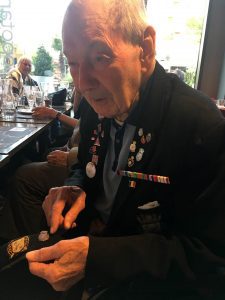
It’s the way he cajoles strangers into friendly conversation. And at age 99, it seems to have worked pretty well for Simeon Mayou. He points out some of the commemorative pins and service medals he wears on his Royal Navy blazer. Then, he pulls his beret off the table and asks for help.
“Just hold the edge of the beret,” he says, “and help me put it on.”
Tish MacDonald, leading our commemorative tour of the beaches of Normandy this week, obliges. His playfulness gets a giggle from all of us as we realize the military veteran just wants to tell us part of his career serving in the Royal Navy during the Second World War, and in particular where he was on D-Day, 79 years ago this week.
“I was a radar operator aboard HMS Fusilier,” he says. “Our trawler cleared the (English) Channel of mines for the ships delivering troops to Utah Beach.”
Mayou, from Horton on the south coast of England, and his shipmates had rehearsed the delicate manoeuvre for months during what were called work-ups. Towing floats tethered a few hundred yards off the stern of their trawler, the crew of Fusilier could capture and cut loose German contact mines that might otherwise explode and sink Allied ships.
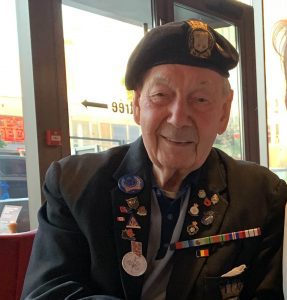
This was June 5/6, 1944, however, and hundreds of warships and thousands of men’s lives depended on how effectively they cleared those mines. By dawn that morning, Fusilier and the sweepers (including Canadian ones) clearing mines to all five D-Day beaches had done their job, and the first of 133,000 Allied troops had begun the largest amphibious invasion in military history.
“I’ve always been most proud of my D-Day medal,” Mayou said.
I am a regular visitor to these historic battlefields, retracing steps here, researching, interviewing, writing and trying to keep veterans’ stories alive. Along the way – even before the pandemic and even with the number of first-hand witnesses of the Second World War dwindling quickly – I am often asked, “What’s the point of remembering all this?”
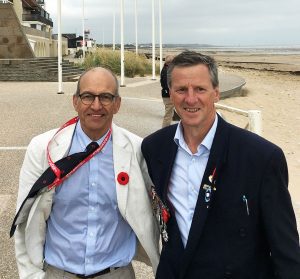
Well, I’ll probably direct those who ask me to a man I met this week. Peter Buckley is a Canadian who now resides in Britain. I wondered why he too had travelled to France this week. He told me, even as a busy businessman, he always takes time to acknowledge his father’s service during the earliest days of the liberation of Normandy.
His father, a British Columbian, enlisted in the armoured corps, and on D-Day came ashore with a French-Canadian tank regiment, the Sherbrooke Fusiliers.
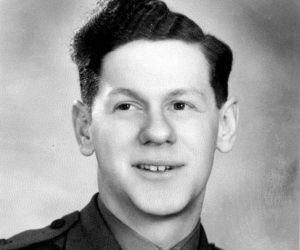
“We arrived in front of the beaches and there were thousands of ships,” Hugh Buckley told interviewers at Juno Beach Centre. “The reassuring thing was there was no way anybody could stop this invasion.”
On D-Day-plus-one, Trooper Buckley, a gunner in a Stuart tank, raced so far inland they got behind enemy lines, but they quickly pulled back. He had no idea how close he’d come to death. Herbert Thistle, a wireless radio operator in another Fusiliers tank, came even closer; his Stuart tank was attacked by a panzer regiment commanded by Waffen SS Col. Kurt Meyer.
“These young SS (Hitler Youth) tank crews captured us and took us to the Abbaye D’Ardenne. They took us into a barn, five of us,” Thistle said. “They had a sniper in front of us. We thought this was the end. Then, a German officer arrived and stopped the shooting,” but not before 20 Canadians had been executed by the fanatical tank crews.
Thistle survived the war in a POW camp, Buckley with the Fusiliers. Both have passed now.
I am also often asked, when the veterans are all gone, who’s going to care that Canadians liberated this part of the world in 1944? Well, in that same Juno Beach Centre interview, veteran Hugh Buckley pointed to future generations of Canadians holding the key.
“I would like all Canadian youth to know the history of the invasion and the role that Canada played,” he said. “It was critical.”
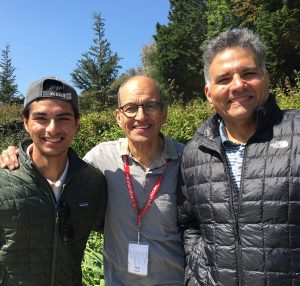
And there’s every reason to believe Hugh Buckley’s wish and that of his son Peter will be fulfilled. Also while on tour this week in Normandy, I met a young University of Western Ontario student, Jahan Antia. He was travelling with his father, a marketing professor from London, Ont.
The two of them have made the trip as a pilgrimage of sorts. Not because a relative served on D-Day. Not because they’re military buffs.
“I think it’s important as a Canadian to see this place,” Jahan Antia said. “I believe I need to come here. It’s part of being a Canadian.”
It has been great to read your posts as you tour the battlefields, Ypres and Juno Beach. I am sure you made many special memories for those on your tour and for those of us who remember being at those memorials in past years.
Thanks for the memories!